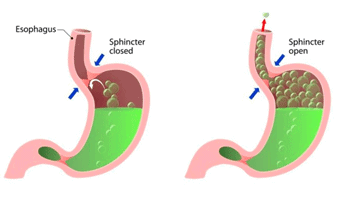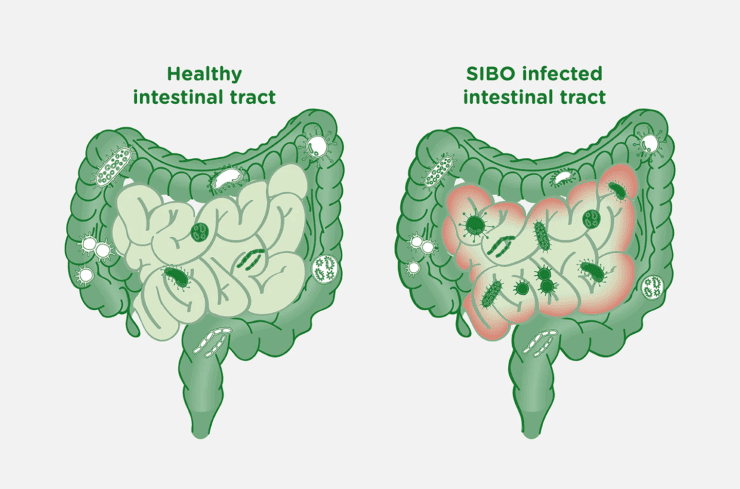In science speak, the medical term for belching is eructation. And there are two main types of burps, depending on where the gas comes from in the body.
Gastric belching
 A gastric belch is the more traditional burp, when gas comes up from your stomach the way biology intended. It’s our body’s way of venting air (otherwise you’d bloat like a balloon)! But if your stomach is struggling with a gas overload, that’s when your belching can become excessive. This is most often caused by swallowing excess air, which can get trapped in the stomach and create pressure – leaving you with an uncomfortable feeling in your middle. To relieve this pressure, you burp.
A gastric belch is the more traditional burp, when gas comes up from your stomach the way biology intended. It’s our body’s way of venting air (otherwise you’d bloat like a balloon)! But if your stomach is struggling with a gas overload, that’s when your belching can become excessive. This is most often caused by swallowing excess air, which can get trapped in the stomach and create pressure – leaving you with an uncomfortable feeling in your middle. To relieve this pressure, you burp.
Supra-gastric belching
Supra-gastric belching is all down to behaviour, caused by subconsciously sucking air into your food pipe. When this happens, the air is quickly forced back out of your mouth as a burp – without ever reaching your stomach.
This type of burping can happen as one-off episodes or it could be a long supra-gastric ‘attack’ where you could burp up to 20 times a minute. And there’s nothing super about it – it can have a big impact on daily life.
GORD (Gastro-Oesophageal Reflux Disease)
Belching a lot, but also getting heartburn or an acidic taste? Reflux could be the reason.
GORD can happen when the ring-shaped muscle between your food pipe (the oesophagus) and your stomach isn’t functioning as it should be. This is called your lower oesophageal sphincter, which usually opens and closes to stop things travelling the wrong way during digestion.

But if it’s not working as it should and gets a little too relaxed, acid and gas from your stomach can creep back up into your food pipe more easily. Enter more belching, as well as a burning sensation and a nasty taste.
What can you do?
It could be time to treat the root cause of the reflux with your doctor or gut specialist. If you’re looking for a gut specialist, we’re here to help. [LINK TO FGC PATHWAY]
Getting to the bottom of your burps
To treat your belching in the best way, it’s super important to understand your triggers.
There are a bunch of science-backed tests that can take a closer look inside your tummy – from finding out how your food pipe is functioning, to testing your breath for bacteria-produced gassy belches. Find out more here [LINK TO INFO ON TESTS]
How to spot the difference between supragastric and gastric belching?
Gastric: usually happens after meals or fizzy drinks – a normal response from the body to bent air.
Supragastric: happens anytime during the day (even when you haven’t eaten or drank for a while) and usually comes in bouts. This is not normal and usually a subconscious behavioural response to stress
What can you do about supragastric belching?
It’s a good idea to check out behavioural or speech therapy options to tackle this. One simple technique that you can try to reduce supragastric belching is diaphragmatic breathing. [See our blog on how to perform this].
What else could be causing your belching?
For some people, excessive belching can be a sign that there’s too much gas being produced from inside your tummy. Here are two triggers you should know about:
SIBO (Small Intestinal Bacterial Overgrowth)
The billions of bacteria living in your tummy help you digest the food you eat – and as they’re feasting, they produce gas.
 But, most of these bacteria are towards the end of your intestinal tract, in the colon. Occasionally, an excess number of bacteria might grow in your small intestine – a condition we call SIBO. This can trigger too much gas – and bring with it bloating, pain, as well as belching (or farting) as your body tries to get rid of this gas.
But, most of these bacteria are towards the end of your intestinal tract, in the colon. Occasionally, an excess number of bacteria might grow in your small intestine – a condition we call SIBO. This can trigger too much gas – and bring with it bloating, pain, as well as belching (or farting) as your body tries to get rid of this gas.
 Why do I burp?
Why do I burp?

 A gastric belch is the more traditional burp, when gas comes up from your stomach the way biology intended. It’s our body’s way of venting air (otherwise you’d bloat like a balloon)! But if your stomach is struggling with a gas overload, that’s when your belching can become excessive. This is most often caused by swallowing excess air, which can get trapped in the stomach and create pressure – leaving you with an uncomfortable feeling in your middle. To relieve this pressure, you burp.
A gastric belch is the more traditional burp, when gas comes up from your stomach the way biology intended. It’s our body’s way of venting air (otherwise you’d bloat like a balloon)! But if your stomach is struggling with a gas overload, that’s when your belching can become excessive. This is most often caused by swallowing excess air, which can get trapped in the stomach and create pressure – leaving you with an uncomfortable feeling in your middle. To relieve this pressure, you burp.
 But, most of these bacteria are towards the end of your intestinal tract, in the colon. Occasionally, an excess number of bacteria might grow in your small intestine – a condition we call SIBO. This can trigger too much gas – and bring with it bloating, pain, as well as belching (or farting) as your body tries to get rid of this gas.
But, most of these bacteria are towards the end of your intestinal tract, in the colon. Occasionally, an excess number of bacteria might grow in your small intestine – a condition we call SIBO. This can trigger too much gas – and bring with it bloating, pain, as well as belching (or farting) as your body tries to get rid of this gas.



